- Home
- Dusty Richards
Wulf's Tracks Page 15
Wulf's Tracks Read online
Page 15
Wulf shook his head. “I have one in Texas. She’ll do fine.”
Washing up for a lunch that his wife delivered them, Coats laughed. “I’m doing me best to bribe ya to stay.”
Her food would not do it either. Smoked sliced cow tongue lathered in mustard on near-stale bread and with her cow-stinking milk.
Coats paid him fifteen dollars, a generous amount, and invited him back to stay on the fourth morning when Wulf saddled his horses and set out west on the Platte River Road alongside the Union Pacific tracks.
The land, they said, was rich, and farmers were planting lots of hill corn in crisscross patterns. Folks lived in dugouts and soddies to prove up on their homesteads. This and Kansas might be the best land for farmers to take up.
When he arrived in Ogallala, he saw enough cowboy hats to warm his heart. They’d thrown open the grassland north of there. Taken from the Sioux who didn’t use it, the land clear to the Dakota line was open to cattlemen and farmers.
When he stopped at a mercantile, an old man came to the edge of the porch to spit tobacco in the mud. He shook his head warily at Wulf. “You better kept your pistol cocked and one eye open all the time. Them’s fine horses and I bet a dozen bastards already seed them and aim to steal ’em.”
Wulf thanked him and went on inside the store. Horse stealing must be a plague in Nebraska. Several farmers he’d spent the night with coming west had spoken about it. When he came out with his food supplies, he stopped and asked about a place to camp. The old man told him he could find one down on the Platte River.
He made camp in the head-high box elders that were barely leafed. Since he’d grained his horses well, he put them on a hitch line close to his bedroll. Besides, the grass had not broken dormancy yet and this area had been grazed down. After a meal of jerky and water from his canteen, which he’d filled earlier out of a well in town, he spread out his roll and with his .45 close by his head, turned in.
In the night, his horses’ shuffling awoke him. Pistol in his fist, he rose to his knees. The sound of Kentucky’s protesting squeal and the loud crack was followed by a man’s scream. “The sumbitch broke my leg.”
Good.
He put two fingers in his mouth and let out a whistle. Someone else went to yelling in protest. There was no moonlight, and with only the stars shedding any light, it was difficult to see much. Kentucky came dragging his lead rope, and Wulf could hear Goose trampling down brush to get back to him.
The man on the ground was moaning.
“Get your hands in the air.”
“I can’t. Damn horse broke my leg.”
“I said get your hands in the air or I’m shooting.”
Goose was soon in Wulf’s face nickering to him. “Easy, big boy. They ain’t stealing you.”
Where did the other one go? He wasn’t long wondering.
“Where are you?” came a voice from the brush.
“Tell him over here and no tricks,” Wulf whispered. Then he saw the outline of the man coming around the brush. “Get your hands in the air.”
The orange blast of the man’s pistol cut the night. At that close range, Wulf expected to be hit. He wasn’t.
After a second of hesitation, he fired his pistol twice in that direction. The other man gave a cry.
“Get your hands up.”
No reply.
Wulf about stumbled over him. Stopping short and making certain he was unarmed, he holstered his own gun and half dragged the wounded man to his partner. Both must have been Indians or breeds.
He tied them back-to-back, then jumped on Goose, leading Kentucky to ride to town. He found a deputy, who promised to come right out there and arrest the horse thieves.
The mustached deputy found two more men and armed them with lanterns and rifles. They followed Wulf back to his camp.
“You say you shot one of them?” the deputy asked, walking beside Goose.
“Yes, sir. He shot at me first.”
“How old are you?”
“Nineteen,” he lied, with no idea how old he had to be to shoot an outlaw.
“You ever shoot anyone before?”
“Once.”
“Who was that?”
“The one that stole the black horse.”
“You might get a sign to wear.”
“What’s that?”
“It should say, ‘Two fellas done got shot trying to steal my horses. You want to be next?’”
The lantern bearers laughed at the deputy’s words. Wulf didn’t even smile. He was relieved when he saw two thieves back-to-back in the lantern light.
The deputy called the one with the broken leg by his name. “Fat Bear, you stealing horses again?”
The Indian, who hardly looked fat, grunted, “Sumbitch kicked me. I was only walking by him.”
“This is Johnny Run,” one of the light bearers said about the other one.
“I never caught your name,” Wulf said to the deputy.
“Alfred Bonner. Nice to meet a real horse thief catcher.”
For the first time, Wulf felt relieved. He’d worried the whole trip back they wouldn’t approve of him stopping the thieves. A smile crossed his face.
“Where are you headed?” Bonner asked.
“Montana.”
“You ain’t seen your last horse thief then,” Bonner said.
“What can I do?”
“Keep on mowing them down. These two will see three years in the penitentiary. If locals had caught them, they’d got their necks stretched on a rope.”
“Thanks.”
“No. Thank you for your bravery. A lesser man would have hid and let them take them the horses.”
The other two shook his hand as well, telling him how brave he was to do what he did. They marched off the two thieves, and left him alone in camp to hitch his horses and try to go back to sleep. That was not a success, so before dawn, he saddled and rode on west while gnawing on jerky.
More sagebrush began to show, and he saw range cows and calves. They were chasing down anything green that showed up. Farming was reserved to the creek bottoms. After the next night’s sleep, he threw frost off his cover sheet—when did spring get to Nebraska?
Past the fort at Sidney, someone told him to go up to Fort Laramie. It was a shortcut to the Bozeman Trail north. But he went to Cheyenne instead.
The railroad center was bustling and mired in mud. He boarded his horses, got a haircut and bath, plus had his clothes laundered. It was still a long way to Billings, but the washing made his shirt and pants fit better, like the old man had promised him back home.
He ate a large steak dinner in a cafe—his first real meal in a thousand miles or so. The entire serving tasted like honey—it was so good.
Two weeks without trouble and he should be at his cousin’s—Herschel Baker’s place. He felt ready for that, too. Have to remember not to talk their legs off. He’d be so full of all this. In a stationery shop he bought two sheets of stationery and two envelopes. Ink and pens were free at their writing desk.
Dear Dulchy,
I am in Cheyenne resting my horses. I seen many Indians in the territory. Lots of farms and farmers. Antelopes look like a deer-goat cross.
I should be in Billings in two weeks. I took a bath and it is not even spring here. They say it comes in May. So it must be close.
I sure miss you and your aunt’s pastry.
My best,
Wulf
Dear Myrna and Andy,
It is a long ways to Montana. My horses are doing well. Captured two horse thieves at Ogallala. They did not get my horses. Helped a smithy shoe draft horses in Nebraska for a few days. Big horses. They say spring comes in May up here. I am ready for it. Miss your good cooking.
Wulf
The next morning he rode north, past lots of sheep outfits. He made notes about the wagons that were with each flock and the dogs working them. They fascinated him the most, but he took no time to stop and talk. He was grateful for the wagon yards for stop
overs.
They hardly had the best eating places or the nicest beds to sleep in, but they were there and he could buy grain and hay for his horses. The teamsters cursed the railroads laying track all over and putting them out of business.
The next morning, he saw his first elk. Three cow elk and two awkward calves were trailing them. Snow remained under trees Wulf called cedars. Pines began to show, and he climbed higher on switchbacks and steeper grades.
That evening, he camped at a ranch-store that also boarded some wagons. The woman ran it was tough as a horseshoe rasp, and even wore a short-barreled pistol on her waist.
She met him with her hands on her hips.
“My name’s Lacy—Lacy Moore. I run the place. I set the price. Collect the fees. Manelita cooks. Ain’t neither of us whores and we don’t mess around. It’s twenty-five cents for each horse. Feed over one full scoop of oats, it’s more. Your supper, breakfast, and bed cost twenty-five cents. So you owe me seventy-five cents.”
She held out her hand for payment.
Amused, he paid and thanked her, then went to put his horses up in a pen. By dark, two more teamsters had arrived. They complained about the road conditions, worthless Indian camp robbers, and other things on their mind. Wulf listened.
At last, one of the teamsters turned to him. “You ain’t talking much.”
“I’m learning all about the road.”
“You’re lucky. Seven years ago you would have been scalped this far north.”
Wulf nodded that he’d heard the man.
“Yes, sir, there’s been lots of men and their horses lost on this road. You ever hear of Fetterman? He and eighty some soldiers got it in ’66. Custer came back ten years later and lost again. They damn near got Crook as well at the Rosebud a few days before.”
“Crazy Horse and Sitting Bull went to Canada. Mark my words, they’ll be back.”
Wulf had heard the same said about the Comanches in Texas. They’ll be back. So as long as they left him alone, he didn’t care.
He mentioned he was going to Billings. He told them he was visiting his cousin who was sheriff up there.
“If he’s ever home. Why, Sheriff Baker runs outlaws clear down to Nebraska to arrest them. I never knew another sheriff who didn’t believe in county lines and went right after them.”
“Maybe we need more like him,” the other man said.
Wulf acknowledged his words—sounded like Herschel took his job real seriously.
The next evening, he made his camp along a small stream. Sticks and cow chips made the fire that heated his coffee water.
Sometime during the night, his horses’ uneasy rustling woke Wulf. His fingers closed on the grips of his .45 while his eyes adjusted to the starlight. A tin pot rattled, and he could make out someone pilfering in his panniers. Easing quietly out of his blankets, he slipped up behind the figure and took hold of the buckskin shirt, jerked the short individual up, and stuck the pistol muzzle in his face.
“Who in the hell are you?”
Must be some boy. An Indian? No, it was a female.
“Who are you?”
No answer.
“I said, who are you?”
“Mona.”
“What were you looking for?”
“Food.”
“Why mine?”
“You have some.”
“Where do you live?”
She pointed south.
She couldn’t be hardly more than in her teens. He looked across the sweeping desert. Where were the rest? A girl in her teens wasn’t out robbing panniers in the night by herself.
“Where are your horses?”
She shook her head. “No horses.”
“Why were you robbing me?”
She opened her mouth and pointed inside. “To eat.”
“How many are in your camp?”
She showed four fingers to him. “No food.”
“You have a man?”
She shook her head. “Yutta has bad foot—no walk—baby—Crazy Mary.”
“Where is the father?”
“Him die.”
Pitiful little thing—he felt bad for pushing her around. How was he to know? He went to the pannier, took out some jerky, and handed it to her. “We’ll go find them in the morning. Here.”
He tossed her an old blanket. “We’ll go feed them in the daylight.”
How did he ever get into these deals? He uncocked his pistol and went back to his bedroll. With the revolver back in the holster, he brushed off his socks, climbed into his bedroll, and started back to sleep
“Too cold,” she said, lifting his covers to get in with him.
Raising up, he shook his head, then surrendered with her pressed to his back.
He should have killed her when he had the chance.
TWENTY-TWO
HE did what?” Marsha’s eyes flew open and her jaw dropped.
“Buffalo Malone paid off the ranch and the house mortgage.” Herschel stood before her in the front entry-way and beat his hat against his leg. He fished the papers out and handed them to her.
“But-but why?”
“‘Cause we saved him from starving, I guess. That was his retirement. Some folks say if McCafferty had left him enough to live on, he’d’ve never reported the robbery.”
“But that’s lots of money.”
He hung his hat on the peg and then the coat beside it. “I guess we can quit worrying about paying it anyway.”
His arms around her, he squeezed her tight against him. Burying his face in her soft hair, he nibbled on her ear. “I know it is crazy, and I never went to Deadwood for some reward. I went to catch the robbers.”
“I know. Your friends who know you know that, too.”
“Hell with the rest.”
“I agree. When are you going back after them?”
He chuckled. “You’ve been reading my mind.”
“Hey, I know lots about you and when you’re getting restless.
“Someone on horseback is in our yard,” she said, looking out the glass window in the front door. “Looks like Indians.”
He shook his head and opened the front door.
The fresh-faced lanky youth bounded off his gray horse and took off his hat. “You must be Herschel Baker.”
Herschel nodded slowly, surveying the others mounted on some thin mustangs. An Indian woman, a papoose, a girl in her teens, and another girl making faces at him.
“You must be Wulf Baker.” Herschel began to grin. What in the hell was he up to?
“I am indeed. I’m sorry, but they were starving when I found them, or they found me. I had to catch some mustangs for them to ride. They were down in the desert with nothing to eat. Yutta’s man was killed.”
“Well, tell them to come in,” Marsha said to Herschel. “I can tell he’s sure your cousin. He’s got your big heart. No one else would break horses for them to ride.”
Laughing, Herschel hugged him and then shook his head. “Welcome to Montana.”
“Boy.” Wulf looked back as Yutta used the crutches he made for her to hobble to the house with Marsha carrying the papoose. “It is sure a damn long ways up here. That’s Mona, and they call her Crazy Mary, but she won’t hurt you.”
The two Indian girls were awed, but Kate took Mona and Crazy Mary by the hand to the back porch to wash up. They followed along, looking around in disbelief at the house’s furniture and polished hardwood floors. Yutta sat on a kitchen chair and rocked the papoose and sang softly to it. She looked so tired and drawn, Herschel wondered how she even was alive.
“I’m sure sorry, ma’am,” Wulf said to Marsha. “I been in trouble all my life with bringing in strays. Most of them were dogs, but I couldn’t leave them to starve.”
She hugged his shoulders and then hurried off to fix food. “I wouldn’t have expected less from a Baker. You know, I married one.”
“Aw, hell, let’s put those horses up,” Herschel said.
“I have some money left,”
Wulf said as they went outside in the sunshine. “To help feed them.”
“Aw, we have enough food,” Herschel said. “You said your father died. What happened to him?”
“He had cancer, Doc said. It wasn’t a lot anyone could do. Doc said there were some springs up in Arkansas cured some folks, but not everyone. Paw said he wasn’t going. It was hard to watch him die.
“I ran the place, paid off the bank—worked in the blacksmith shop in town. Trained horses and dogs. Six months after Dad died, Ma married Kent Hughes. He took over everything, even sold all the yearling heifers and steers. There was no market for them. Sold them anyway and put the money in his own bank account.”
“I knew him. He wasn’t worth killing years ago. His dad had a little more money than the rest of us. He raised him spoiled.”
“I came close to killing him. He whipped me with a girth and the next time with reins. I’ve got these scars.” Wulf gathered the rope reins of the mustangs and headed after Herschel, who was leading Goose and Kentucky out back of the house. “The next time he came at me, I used a singletree on him. He wouldn’t quit and I busted up his ear with it.”
“Let’s put them in the lot and the good horses in the stalls. These are sure good horses.”
“Yes, I rode them up here.”
“What happened next with Hughes?”
“He had me arrested for attempted murder. I had a trained dog and horse. After I beat this Colonel Armstrong with my trained dog, then Hughes sold him the dog and horse, saying I was a minor.”
Herschel shook his head wearily as they unsaddled and took off the packs. “What did your mother say?”
“Nothing. Nothing. She’s under his spell, I guess.”
No wonder he rode to Montana. “I don’t blame you for coming up here.”
“I have a good lawyer working on my behalf. That ranch is supposed to be mine. Dad left it to me. But I’m still a minor, they say. But by winter, I’ll be eighteen. I had to get out of Texas or kill him.”
“I understand that.”
“Tell me one thing. Those four have no one. Yutta broke her foot and it never healed, so she can’t walk. It’s her baby. Crazy Mary’s loony but she’s sweet, and Mona is a pack rat. That’s how they ate, she was a camp robber.”

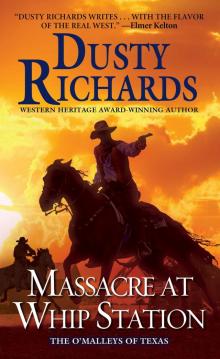 Massacre at Whip Station
Massacre at Whip Station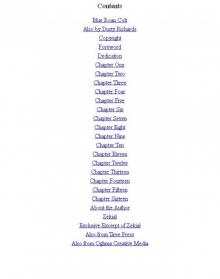 Blue Roan Colt
Blue Roan Colt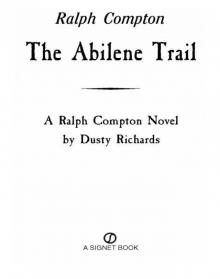 The Abilene Trail
The Abilene Trail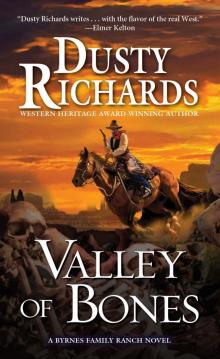 Valley of Bones
Valley of Bones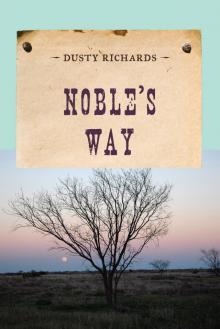 Noble's Way
Noble's Way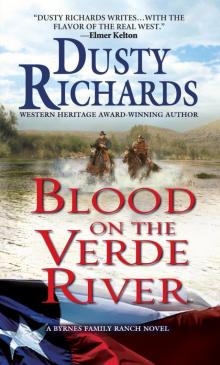 Blood on the Verde River
Blood on the Verde River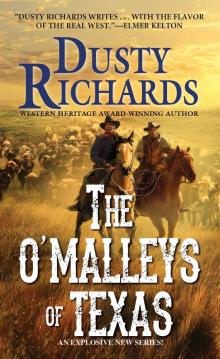 The O'Malleys of Texas
The O'Malleys of Texas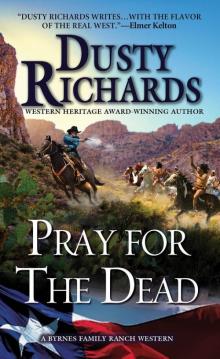 Pray for the Dead
Pray for the Dead Arizona Territory
Arizona Territory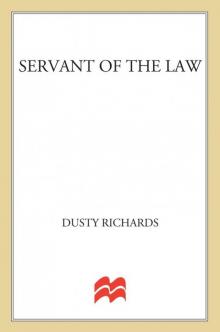 Servant of the Law
Servant of the Law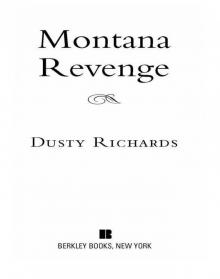 Montana Revenge
Montana Revenge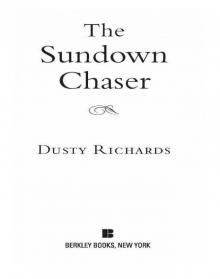 The Sundown Chaser
The Sundown Chaser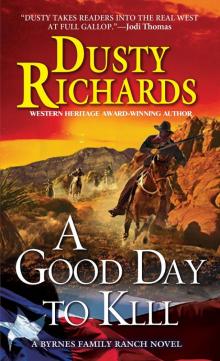 A Good Day To Kill
A Good Day To Kill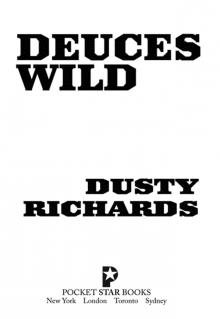 Deuces Wild
Deuces Wild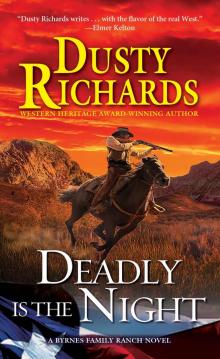 Deadly Is the Night
Deadly Is the Night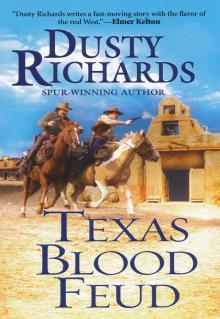 Texas Blood Feud
Texas Blood Feud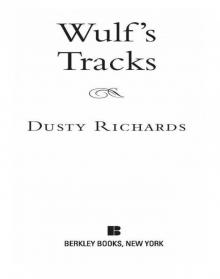 Wulf's Tracks
Wulf's Tracks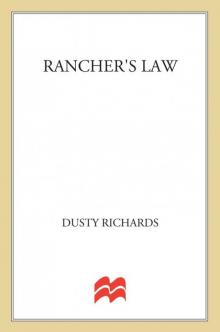 Rancher's Law
Rancher's Law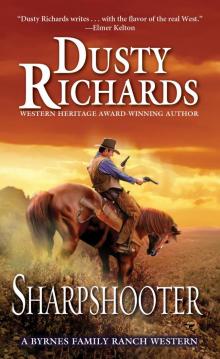 Sharpshooter
Sharpshooter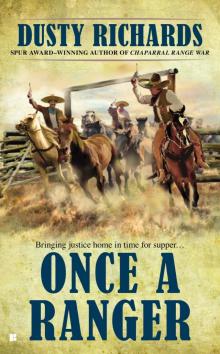 Once a Ranger
Once a Ranger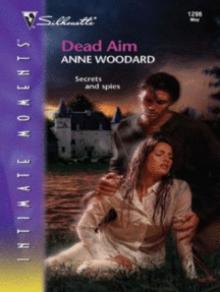 Dead Aim
Dead Aim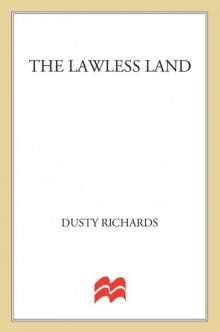 Lawless Land
Lawless Land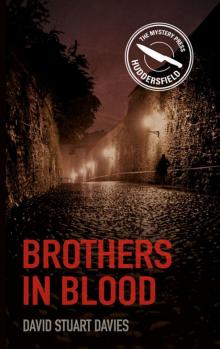 Brothers in Blood
Brothers in Blood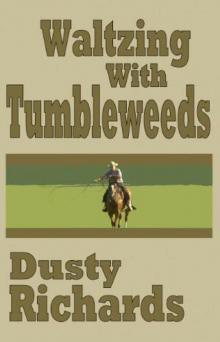 Waltzing With Tumbleweeds
Waltzing With Tumbleweeds